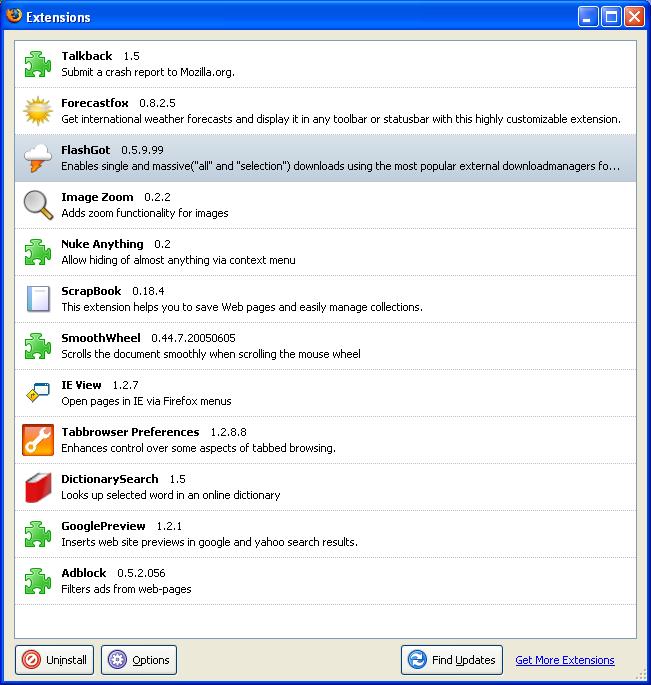The first part of this blog provided a brief introduction to Internet browsers and the four browsers that I will review. I’ve broken the review up into two parts to make for easier reading. Reviews are organized alphabetically by browser name.
● Firefox 1.5. Firefox, by Mozilla, is the only open source browser of the four found here. Open source means that the programming code that allows the program to run is available and modifiable. Furthermore, Firefox was developed by users around the world using the open source format so you can think of it as a browser designed to fit the needs of everyday Internet users. Firefox is highly customizable such that you can download extensions created by other users to enhance the look, feel, and functionality of your browser. I’ve included a screenshot of a list of the extensions I’m currently using in Firefox.
Firefox has gained a lot of support over the past year or so and various sources report that it accounts for about 10% of the browser market. Since Firefox uses a different rendering engine than Internet Explorer (IE), some pages created for IE and opened in Firefox may not display properly. This is becoming less of a problem, however, and I have had very few problems with pages not showing properly. Also, the browser itself is rather bare bones to keep the download small, but it’s still very useable without any extensions. If you choose to use Firefox, however, you’ll probably want to use extensions.
See the Firefox homepage for screenshots and a download link.
● Internet Explorer 6.0. IE 6.0 has been out since Windows XP debuted in 2001. While IE version 7 is in beta testing and will be released sometime during 2006, I will focus on the version currently available to the public (version 6).
Besides being around for over 10 years, IE has built-in support for Windows Messenger (an instant messenger program) and the ability to add toolbars from the likes of MSN, Yahoo, and Google. Contrary to popular belief, you can have tabbed browsing in IE 6, but you must add the MSN search toolbar to do so, and even then, browsing is a bit awkward. IE 7 is supposed to include tabbed browsing as a base feature. Anyone who has used a recent version of Windows has probably used IE, since it’s considered a part of the operating system. In fact, Windows Vista, the next version of Windows, will change the name of IE to Windows Explorer to match the broad function that IE is currently serving.
Much of the criticism of IE 6.0 is about security. “With great power comes great responsibility” (from the movie Spiderman) and that is where Microsoft has placed itself. By commanding over 80% of the Internet browser market, Microsoft has also made IE a target of attacks and loopholes. Often it seems like IE isn’t fixed as often as security holes are found. Patches are created more often that we might realize, but it is still disconcerting to feel that someone from across the world may be able to access your hard drive. If you choose to use IE, then I recommend keeping your anti-virus, anti-spyware, and firewall programs up-to-date. Actually, this is good practice regardless of the Internet browser you use.
If you don’t have a copy of Internet Explorer 6, you can download a copy from Microsoft.
(AWest)


